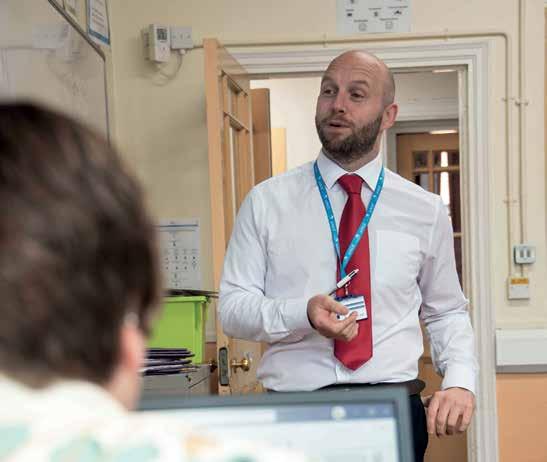Education Supporter
Supporting education staff through evolving roles



As always, I’m delighted to be writing to you at the dawn of a new academic year. I find it personally very satisfying to be able to demonstrate to you, our generous donors, how much you have enabled us to achieve since I last wrote to you, and how important you are to us. We often feel a little nervous going into a new academic year, wondering what the latest challenges will be for our education workforce. Earlier this year, we conducted an important research project called “Teaching – the new reality” (more details on page 7). The shocking results shine a light on how ‘teaching’ – in its traditional sense –has changed dramatically, particularly in the aftermath of the pandemic.
More than ever before, children are arriving at school with significant needs that require attention before any learning can take place. Education staff have increasingly had to take on the roles of social workers, parents and counsellors before they’re able to even begin teaching. The report shows startlingly high numbers of staff buying food, clothes and supplies for students, as well as helping them resolve family conflicts and mental health issues.
Alongside these challenges, the cost of living crisis shows no signs of slowing down. The impact on education staff is painfully transparent to us. Every day, we witness the direct impact through
applications for our emergency grants. For several months now, we have been seeing record numbers of applications for financial aid. We have had to redirect some of our funds into this area in order to help as many people as we can, but this is far from ideal. Fundraising for our grants service, and our other vital services, is always a priority, but even more so now, as these services will become at risk of being unsustainable in the near future.
While all of this appears to paint a slightly bleak picture, we continue to be humbled by the passion and dedication of the education workforce. However, we urgently need to raise awareness and acknowledgement that high-level and urgent changes are needed. In doing so, we can secure the long-term attractiveness of the teaching profession, ensuring that future generations will learn in schools staffed by high quality, productive educators.
Please accept my heartfelt thanks that you choose to continue supporting us. We cannot deliver help or influence change without you.
Warmest regards,
Sinéad Mc Brearty CEO, Education Support
Teaching: the new reality
The lives you’ve changed – Karel’s story
The lives you’ve changed – Sarah’s story
Focus on… our helpline
Your voice – your vision for the future
The lives you’ve changed – Sian Marie’s story
Boundless: helping you make the most of your retirement
Break-time quiz
Please remember the helpline is there for you even if you’ve retired or no longer work in education.
Address 40A Drayton Park, London, N5 1EW
Phone 020 7697 2750 (general enquiries)
Helpline 08000 562 561 (free, confidential 24/7 helpline)
Email fundraising@edsupport.org.uk
Website educationsupport.org.uk
Some of our key findings included:
62% reported offering increased amounts of emotional support to pupils since the start of the COVID-19 pandemic
62% reported that pupil behaviour takes up more time

50% reported being more likely to be supporting staff and colleagues with their emotional wellbeing
71% told us their additional responsibilities had a negative impact on their mental health
71% stated they were emotionally exhausted
66% feel little or no support is offered to their pupils by public bodies (such as social services, CAMHS and the NHS)
In addition to our annual Teacher Wellbeing Index research, which we highlighted in the last issue, earlier this year we published the results of some new research which we wanted to share with you:
Teaching: the new reality shines a light on how the role of education staff has changed, particularly in the aftermath of the pandemic.
What we found quite shocking, was that the role of the classroom teacher has expanded dramatically. Many education staff are picking up the pieces that families and the wider community would, in the past, have covered. This is putting even more pressure on an exhausted workforce, which ultimately has an impact on children and young people’s education.
This occurs in the wider context of a cost of living crisis and rising mental health challenges among children and young people. While teachers and education staff are rising to the new challenges, a significant number report feeling under-prepared to take on these new responsibilities.
Our findings paint a picture of an education system – and wider public services – that are struggling to meet the level of need required by children and young people, and therefore limiting their life chances.
More than ever before, children are arriving at school with significant needs that require attention before learning can take place.
There were 4.2 million children living in poverty in the UK in 2021-22. That’s 29% of children, or nine in a classroom of 30.”
(Child Poverty Action Group)

In 2021-2022, 22.5% of all pupils are eligible for free school meals (a measure of those in relative or absolute poverty). This represents just under 1,900,000 pupils.” (Department for Education 2023)
Supporting learners outside of their teaching role has increased significantly:
Sinéad Mc Brearty, our CEO, said “In the wake of the pandemic and in the midst of the cost of living crisis, education has rarely mattered more. The UK needs high quality, committed teachers who are equipped to do their best work. It can be easy to lose sight of this amid competing policy priorities and the strain of poor industrial relations. The quality of classroom delivery is crucial – you can have great pedagogy, curricula and data, but it won’t get anyone very far without a great teacher to bring it to life and make it meaningful on the day.”
74% of staff often help pupils with personal matters beyond their academic work

41% had bought their pupils supplies such as pens, paper or bags
“Unfortunately, too many of our great teachers are ground down by the weight of an intense, emotionally draining workload. Too many leave the profession each year. This is not the intention of education policy, but a costly side-effect. We hold a clear view of education: children and young people should be supported to attain academically and to be healthy and hopeful for themselves, their communities and this country as a whole.”
33% reported helping their pupils resolve a family conflict

26% had prepared food for pupils when they didn’t have any
“But, as this report highlights, this is not the path we currently tread. We cannot ignore this evidence. The growing mismatch between the demand on schools and the resources available to meet it is a circle that cannot be squared. For too long, the gap has been filled by education staff whose commitment to their communities trumped their personal needs – a tax on their vocation. This is self-evidently not sustainable. It is time for change.”
1. It’s time to decide whether schools are the front line of children’s services, or whether they are specialists in education. The status quo is failing children and education staff. If we cannot provide this level of clarity, we should plan for increased attrition from and recruitment into the profession. The attractiveness of working in education is declining rapidly, due to the consequences of this lack of clarity.
2. Wherever policymakers land on this issue, there must be wellresourced services for children and families. We must ensure that there is sufficient support in the system over the next five years whilst improvements are made. This should include supporting educators through ring-fenced funding for reflective practice or professional supervision for those in roles most at risk of emotional exhaustion.
3. Education departments need robust recruitment and retention strategies that reflect this new reality. By systematically addressing the drivers of poor wellbeing, a range of changes can be implemented to improve the attractiveness of the profession. Compared to the cost of attrition in the workforce, we believe that these changes can be comfortably cost-neutral.
4. Training frameworks are essential to the profession, but will only continue to be effective if they reflect the reality of life in schools. The frameworks should be updated to reflect the new reality of life in schools – with the necessary time and resources provided –equipping teachers and leaders with the skills they need to stay well and stay in the job for the long run.
This report brings together the findings of a number of research activities commissioned by Education Support: • A survey of 3,082 education staff working in the UK, conducted between 21 June and 29 July 2022 with YouGov. Some findings from this research have already been reported in the Teacher Wellbeing Index (2022)1 • An online poll of 1,004 secondary school teachers working in England, conducted between 18 and 28 October 2022 with Public First • A series of focus groups, held by Public First, of school teachers and senior Leaders, carried out as part of Education Support’s Commission on Teacher Retention in 2023 • A literature review into “Stress, Burnout, Anxiety and Depression: How they impact on the mental health and wellbeing of teachers and on learner outcomes” published in 2021 with CooperGibson Research
5. Resources, and responses to the needs of children and young people, must be prioritised in the least well-resourced areas. Schools in the least well-resourced areas experience these issues more intensely than elsewhere.

6. Policymakers need to listen closely to teachers and leaders currently working in ordinary (not extraordinary) schools, to ensure that policies are grounded in reality. For example: education departments could run regular ‘Big Ask’ type surveys to gain real insights that inform policy development; an annual assembly of education staff could be established to support policy decisionmaking, with schools generously compensated and adequately forewarned when their staff participate.
This is a brief overview of the report’s findings. To read the report in full, please visit educationsupport.org.uk/new-reality
PE and supply teacher Karel shares his experience of how our grants service helped him keep his house.
“I have always enjoyed the interaction you get with kids when you teach, being in front of a class and making PE interesting and fun. I liked the camaraderie you get in a good team in a good school, and wasn’t interested in managementI just wanted to teach.”
“I’d noticed a change over the past few years in the way slightly older teachers and colleagues who didn’t want to go into management were being treated - their jobs got changed without their input, or they experienced constructive dismissal before cheaper staff were hired, including some who aren’t even qualified teachers. This is what happened to me, so I ended up doing supply teaching.”
“In January 2020, I took a maternity leave cover job but when the lockdown hit, the teacher on maternity leave returned to work suddenly. I was let go, and as all the schools closed, had no furlough pay and no access
to benefits because I had some savings. I wanted to work, but I couldn’t, there was nothing.”
“There were times where I felt like I’d had enough. I think of myself as mentally strong, but this put so much pressure on me and on my relationship. I was very low, but tried to remain positive for the kids.”
“Over the next 18 months I saw all my savings disappear, and then ended up in debt from just having to cover my family’s living costs. We tried to cut back, even on food, but we have three children, so there’s only so much you can cut. Our car was old, it broke down, and couldn’t be fixed. Our boiler broke and I had my motorbike stolen. It really was just one thing after another.”
“I started doing some research online and found out about Education Support and the grants they offer, and I applied. I got a grant to pay for three months of

my mortgage, just as my mortgage holiday was ending. Being realistic, I probably would have lost my house, if it wasn’t for the help I got.”
“The grant came at a time when I really needed it. Trying to negotiate the benefits system, as the only person supporting your family, it’s enough to drive you insane.”
“It was a massive help to get the grant, it really did save me.”
“I’d 100% recommend Education Support - I think it’s really important people know about the support that is available to them. It shouldn’t be needed, but it is, and it was a huge help.”
We continue to be inundated with grant applications, with many citing the cost of living crisis as being a factor. The majority of applicants are requesting help with food, travel expenses to get to work, rent and energy bills.
Former university administrator and mum Sarah also had the added pressure of a recent relationship breakdown and two young boys (aged 10 and 8) when she came to us for assistance. Here’s part of her application:

“A few months ago, my husband and I separated and he left the family home. Since then, he has been living with his mother and my children and I have stayed in our rental property. I was an administrator at the University of Essex for many years, but I’m currently self-employed. At the moment I don’t earn a lot from my business, and am looking to go back into full-time employment in the education sector as soon as possible.”
“Due to my husband leaving, my young boys and I are now without his full-time salary. I need to keep us in our home as it’s so near their school and I don’t want their lives disrupted anymore than they already have been. In addition,

my husband left me with over £2,000 in energy debt and over £800 in water debt that has built up over the five years that we’ve been living here. I’m talking to the providers about payment plans. But at present, my biggest concern is paying the rent, feeding the boys and putting fuel in my car to get to interviews, take the kids out or to go food shopping.”
“Any help towards paying off the energy debt, towards rent, clothing or groceries would be hugely appreciated, just while I get myself back on my feet. I am currently applying for full-time jobs and I have some interviews lined up, so I expect things to improve for us soon.”
We were happy to award £600 to assist this lovely family. Thank you for supporting us and enabling us to make life easier for people like Sarah.
Our grants team is working hard to process our highest ever level of applications in a timely manner. If you do have an application pending, please bear with us and we will contact you as soon as we are able to.
Our confidential helpline is just one of the many support services we offer. Education staff call us for a wide variety of reasons – from needing a one-off call to recover from a bad day at work, to requiring more regular contact on a number of simultaneous issues.
We’re exceptionally proud of the high standard of counselling our team provides, which is reflected in the feedback we receive from callers. We thought you’d like to know a little more about it, as it’s one of the services that your kind donations enable us to provide.
9,570 people are supported by our helpline every year
59% of calls deal with work-related stress
700+ people each year are assessed to be at risk of suicide
Teachers and education staff can call us to talk through all kinds of concerns including:
• Managing difficult feelings or situations
• Advice on boundary-setting and self-care
• Getting the best out of your work relationships
• Planning for or processing difficult conversations
• Any challenging personal matter
• And we’re also here if you simply need to vent!
Who can call the helpline?
Any serving, former or retired member of staff who has worked in any part of the education sector including (but not limited to): early years, primary, secondary, further, higher, adult and/or prison education sector.
What happens when you call?
The helpline team will find out why you are calling and choose the best person for you to speak to. Depending on your needs they might:
• Deal with your call personally and offer emotional support straight away
• Connect you to one of our other services such as grants or information
• Assist with referral for long term treatment (for example, to your GP)
Who will you be speaking to?
• Our qualified counsellor will ask some questions to find out more about your situation and might help you set some short-term goals to find a way forward
• If you need counselling, you’ll be speaking to one of our qualified British Association of Counselling and Psychotherapy (BACP) counsellors
Elizabeth, an experienced SEN teaching assistant called when she recognised she was struggling with a demanding workload, on top of her husband and daughter both being seriously ill. She said:
“The helpline counsellor gave me permission to feel what I was feeling. Get in touch as soon as you feel things aren’t right. The call really helped me.”
Sue works in a pastoral role at a sixth form college. After a traumatic safeguarding incident took a big emotional toll, she called our helpline and spoke to one of our qualified counsellors. Sue said:
“I knew I needed to talk it through with someone outside of the situation soon after it happened.”
Earlier this year we wrote to many of you to ask if you’d consider leaving us a gift in your will to help future generations of education staff and students. As part of that campaign, we also asked you to tell us what you’d like to see in future in the education sector. Thank you for all of your responses. We’ve included just a few below:
I am retired but still involved as a governor at 2 primary schools. I would like to see:
1. Abolition of SATS, Phonics, multiplication tests and any formal measurements in EYFS
2. Abolition of OFSTED - replaced by advisory teams
3. Strengthened & well-resourced local councils who can provide services
4. Strengthening CAMHS, educational psychology, speech therapy and services
5. Good pay for teaching and support staff including annual retention packages
6. Paid time off for study and Continuing Professional Development

7. Revised primary curriculum based on Early Years Foundation Stage area of learning but deepened and extended.
8. Better transitions between Year 6 and Year 7
9. Teaching exclusions thoroughly reducing or eliminating the disproportionate number of vulnerable children and minority groups being excluded
10. Appointing a Secretary of State and teams who understand education and who believe it is about personal and intellectual growth & development and who understand that not everything in education is quantifiable or measureable
Alison HattI worked in Primary, Further Education and Secondary comprehensive education. I have been retired for over 20 years. You don’t need me to detail the many ways education is being eroded. I am constantly amazed that many people choose to work there, knowing the lack of resources, constant interferences from government, media and demands of parents, OFSTED, so called education leaders, experts or innovators.
I would like to see real support from these and no more of their interference and constant demands of change.
I did enjoy my time as a teacher. I would like to think that teachers will still be able to enjoy their career. Present pressures do not help. Best regards, Anne
 Bryant
Bryant
To see a return to more creativity – music, dance, painting, claywork & drama/theatre. I am still in touch with pupils from 1960’s and 1970’s who appreciated arts experiences. A good basis – exploring, discovering, socialising, building confidence, lifting mood, appreciating and learning from each other. I could go on with the list of positive outcomes in primary school. I later worked in secondary education –art/dance/English – all creative experiences and part time movement with disabled children from nursery to secondary. I have so many photographs where the important factor for me is that they all look so happy.
I also enjoyed workshops with the drama department in Manresa College of Education (long gone) watching students tackling new skills, gaining confidence through movement and dance.
Good education from the earliest possible age is the foundation on which all our futures depend. Well-educated, healthy children will form our future society and the better educated they are, the more likely they will be to understand the immense challenges the world faces and be able to meet those challenges. More investment – financial and with staff and better buildings – is necessary and the government should stop insisting on a narrow curriculumand start valuing all educators and what they do, and let them get on with their jobs.
Better buildings, free school lunches for ALL children, much improved pay for teachers, more acclaim for their hard work.
Wendy AndertonFinally set up a small education unit in Deptford (SE London) for school non-attenders/school refusers/ truants whatever they are called now….known locally as The Schoolhouse. Community-based and lots of creative activities alongside basic skills. After ten years I set up the Community Education Project to find ways to make better links between school and community. All through creative get-togethers, festivals, arts etc.
Brenda MoorI am worried about how teachers are trained. I myself went to Teacher Training College which, I felt, as well as advancing my subject education, taught me about children! I did not stay on to do a Batchelor of Education, but later went on to do an Open University degree. Today, as I understand, teachers have to go to university and then do a year to gain a teaching qualification. What concerns me is that so early on in this, they are thrown to the wolves doing teaching practise. I know so many parents who have children that have gone down this route, only to either crack up or just give up. I feel we are losing so many potentially good teachers by this approach. There must be a better, more humane way to train our new teachers.
Beryl StanleyI have been retired for a long time, and feel completely out of touch with the world of education. In the latter days of my teaching career, I found that the biggest cause of stress among my colleagues was NOT the workload, but the behaviour of some pupils and having to deal with them on a weekly basis.
Anecdotal stories seem to point that this is still a problem, and a major reason why young teachers leave the profession after only a few years.
Eddie CowardI very much enjoyed most of the 30+ years I spent teaching in a variety of primary schools in the UK and a year on a special exchange in Vancouver. I never imagined I would take early retirement from my second Headship in Oxford, but life often presents us with unexpected twists and turns. As changes in education were being made and we were presented with a one-off offer I, and a number of colleagues, accepted it. I missed being in a school, but some supply teaching came along, then work in a nursery, then playgroup and for several years I worked for the RSPB alongside the warden of our local reserve here in East Devon, which was a joy and very rewarding. So early retirement offered some valuable experiences.
The present situation in the educational world, like most of our institutions, is very concerning. Whilst there are exciting things happening in schools, if you talk to presentday teachers there are so many other pressures on them that they cannot teach to the standard they would wish. Therefore, they do not find their efforts as satisfying as they would hope. I hope more recognition will be given to teachers and their value to families, children and young people who are the future of our nation and adequate resources provided for them to fulfil their task. Thus giving all that an enjoyable, satisfying career offers.
Gillian PrideauxI feel we are losing so many potentially good teachers by this approach. There must be a better, more humane way to train our new teachers.
Sian Marie received support from our helpline when she was at her lowest. She told us that calling the helpline kept her alive. She was treated badly by several members of staff at her school following a promotion and was having panic attacks daily. Fortunately she found us and called. She said it was the first time she ever felt someone was truly listening to her in relation to her mental health.
She said: “The woman I spoke to really knew what it meant to be a teacher. It was really, really special. Other people don’t understand, so they make suggestions to help your mental health that just don’t work if you’re a teacher. But the person on the phone knew and understood. I felt she wanted to listen to me, as a person and a teacher, and it really helped.”
“My teachers made such a difference to me at school - which inspired me to teach. I found a busy and fulfilling job at a secondary school in London and was promoted after a few years. That same year, my father had a stroke and things got really tough, both personally and professionally. At school, I put my head down to try to get through
it and concentrate on doing a good job, but lost friends as a result. I was getting shouted at by senior leaders and blamed for things that weren’t my fault and my mental health started to deteriorate.”
“I’m very passionate but I’m never sure if I’m doing a good job. I was having panic attacks and finding it really hard to get through the days. Eventually I spoke to HR who told me about Education Support and their helpline. I put it off for ages but then thought “what’s the worst that could happen?”
“When I did ring, the person I spoke to asked me if I’d have waited this long if I’d broken a bone, which helped me see how important the call was. It’s important to me
that people learn from what I’ve experienced. I know that I’m never going to be standing on my own again - Education Support carried me when I couldn’t walk. Sometimes the scariest thing is reaching out, making that phone call. But it really was a lifeline, by making those calls I’m still alive.”
“After the call I continued to use the Education Support newsletters, website and resources to manage my mental health. I was inspired to do more about mental health at my school, so I paid to become a mental health first aider and started to discuss the subject at school.”
“I then had the worst depression I’ve ever experienced. I had suicidal thoughts, started blacking out and having several panic attacks a day. School staff continued to treat me badly, shouting at me in front of the whole school, telling me there were no problems with mental health at the school, and to stop talking about it.”
“I was at my lowest point and I wasn’t being listened to. I ended up in hospital and finally got a diagnosis for ADHD, which helped me feel validated and seen. I also

got back in touch with Education Support, who were really supportive yet again. I trusted their advice and it made things more manageable for me at school.”
“Other people suggested, and still continue to suggest, that I leave my job. But I’m here to help and I know the difference you can make in a single day as a teacher. I teach because it means that every day a young person leaves here feeling that they matter. I might be told to stop talking about mental health,
Please don’t wait to call us if you need help. We’re here to listen.
0800 562 561
“I saved £1,150 on days out and holidays in one year!”
Keep doing the things you love with a little help from Boundless. Read about how Karen used her Boundless membership to make savings on days out and family trips, and still went on three holidays!

“Now I’m retired I’ve got a lot more free time and I’m always looking to take advantage of good deals for days out and trips with family. I’ve been a member of public sector club Boundless for about 30 years – initially I joined just to get cheaper car insurance, but since retiring I’ve used my membership a lot more and made big savings on holidays and days out. In total I’ve saved just over £1100 in the past year on holidays and days out with family, which isn’t bad.”
“Our main holiday this year was a special trip to Antigua, which we booked through Barrhead Travel with our Boundless membership and we saved almost £800. We really enjoyed our trip – the hotel was lovely, it had a real rustic charm to it, and we enjoyed sitting on our balcony watching the different birds entertaining us with their antics. A couple of years ago we also had
a holiday at Whitemead Forest Park in the Forest of Dean with our son Stuart and his family. We stayed in a woodland lodge and saved just over £200 (£220). We liked it so much that my husband and I went back to Whitemead – we stayed in an apartment the second time and saved £184 through my membership.”
How do you find out about discounts?
“Boundless magazine is always useful for spotting good deals on holidays – whether it’s their own partner discounts or from other companies. We were inspired to go on a cruise in Croatia last year from an ad we saw. I get access to the Kids Pass app through my membership – so I always compare prices for activities to do with my grandchildren in the holidays.”
What savings have you made on days out?
“Last summer my husband and I visited Kew Gardens for the first time. Boundless members get unlimited access all year round, so we saved about £30 (£28.75).
The roses were all out and the water lily part was wonderful. We had afternoon tea there too. We’ll definitely make another trip to Kew. Another advantage of Boundless is their member days which are held all over the country – a couple of years ago we went to one at RHS Wisley and you could join a guided tour – all completely free. We have it on our list to visit Wildfowl & Wetlands Trust sites and
Wakehurst in Sussex when the weather gets better, as we can get unlimited access with Boundless membership.”
How have you made household savings?
“We insure both our cars through LV=, saving £59 per year in total with our Boundless discount, and we have our house insurance through LV= too, saving another £10.
I bought a car with Boundless through their deal with Griffin (in 2020) and saved £7,000 on a Peugeot 2008, which was a great saving. I’m hoping that when I come to change my car, I’ll get another good deal with them.”
Don’t miss out on new experiences and unforgettable days out with Boundless. Join today for just £40 a year, visit boundless.co.uk/ES or call free on 0800 669944* quoting Education Support. Terms and conditions apply.
*See boundless.co.uk for phone lines opening times.
Taking care of your own wellbeing often means finding a helpful diversion and having a bit of fun. Which is why we always include a quiz for you. Good luck!
1. How many permanent teeth does a dog have?
2. What is the most sold flavour of Walker’s crisps?
3. What is the full postcode of the Houses of Parliament?
4. What does the Latin word ‘tempus’ mean in English?
5. How many chukkers are there in a polo match?
6. How far is the moon from the earth in miles?
7. What is someone who believes in antidisestablishmentarianism opposed to the disestablishment of?
8. Which is longer – a nautical mile or a mile?
9. Saying the name of which dried fruit used to encourage people to smile before a photo in the 1800s, before the word “cheese” was popularised?
10. Which country in the world is believed to have the most miles of motorway?
11. Gordon Sumner is the real name of which famous British musician?
12. How many keys are there on a piano?
13. Glossectomy is the removal of all or part of which body part?
14. What was the first single to be released by the band Oasis?
1.5 Geoff Hurst famously scored a hat-trick in England’s 4-2 win over West Germany in the 1966 World Cup final. Who scored the other goal for England?
We know you already support us. But if you’d like to and feel able to send a gift, thank you so much. We
An increasing number of education staff apply for a grant because they’re facing the threat of losing their home. Some even spend nights sleeping in a car. Your donation could make sure they have a bed for the night.
Across our counselling services, we talk to many people every day who are assessed to be at risk of suicide. Your donation could make sure we’re there to answer those desperate calls. Your donation could make sure we’re there to answer those desperate calls.
Many teachers or people working in education come to us when they can’t afford to replace or fix essential items in the home during times of financial struggle. Your gift could replace a vital kitchen appliance or even a bed to make life easier for them and their family.
I would like to make a gift of:
£25 £50 £150 Other £
Please debit my Visa Mastercard Card number
Expiry date /
Or I enclose a cheque/postal order/CAF voucher made payable to Education Support
If you prefer, you can to donate online at educationsupport.org.uk/donate
Please complete in CAPS:
Name
Supporter number
Address
Let us know how you did or make a suggestion for the next issue by emailing us at magazine@edsupport.org.uk
Phone number
(this can be found at the top of your covering letter)
Postcode
We will stay in touch to keep you up to date with information about the work your support is making possible, our news, impact, events, fundraising appeals and other ways you can get involved.
You are in control of how we communicate with you, and if you’d like to change what you receive, how you receive it, or stop all communications please tell us. You can change your preferences by emailing us on fundraising@edsupport.org.uk or calling 020 7697 2750.
Make your gift worth 25% more
If you are a UK taxpayer, we can claim an additional 25p from each £1 you donate from HMRC. All you need to do is tick the box, sign and date below.
I confirm that I am a UK taxpayer and would like this donation, any donations I make in the future or have made in the past 4 years to Education Support to be treated as Gift Aid donations.
I understand that if I pay less Income Tax and/or Capital Gains Tax than the amount of Gift Aid claimed on all my donations in that tax year, it is my responsibility to pay any difference.
Signature:
Date: /

promise to put it to good use as always









